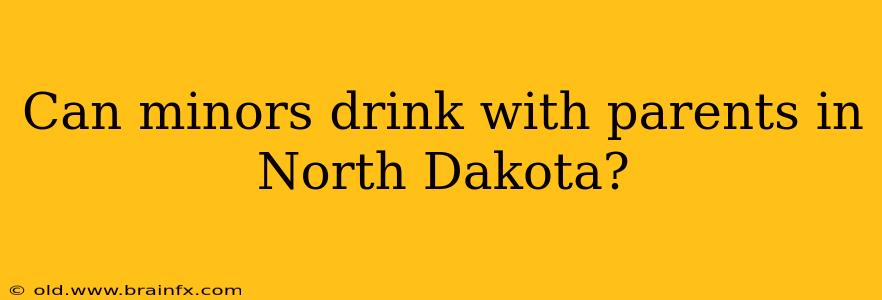North Dakota's alcohol laws regarding minors are complex and don't allow for the simple answer of "yes" or "no" to the question of whether minors can drink with their parents. While there's no specific law permitting it, there are also no laws explicitly prohibiting it under certain very limited circumstances. This nuanced situation requires careful consideration of various factors and potential legal interpretations.
Understanding North Dakota's Minor in Possession (MIP) Laws
North Dakota's primary law concerning underage drinking is centered around the concept of Minor in Possession (MIP). This law makes it illegal for individuals under the age of 21 to possess, consume, or purchase alcohol. Violations can result in significant penalties, including fines, community service, and even a criminal record.
The Grey Area: Parental Exception?
While no explicit exception exists that allows parents to provide alcohol to their minor children, there's a lack of specific legislation directly addressing this scenario. This ambiguity leaves room for interpretation and potential leniency in certain situations. However, it's crucial to understand that relying on this ambiguity is risky, and law enforcement's interpretation may vary.
Factors Influencing Legal Outcomes
Several factors influence how law enforcement and the courts might handle a situation involving underage drinking in the presence of parents:
- Context of Consumption: A small amount of alcohol consumed during a private family dinner might be viewed differently than a large quantity consumed at a party.
- Parental Intent: Was the alcohol provided intentionally, or did it occur incidentally? Intentionally providing alcohol to a minor is a far more serious offense.
- Evidence: The presence of evidence (empty alcohol containers, intoxicated minors) significantly impacts the likelihood of legal repercussions.
- Prior Offenses: A history of alcohol-related offenses by either the parent or the minor could worsen the situation considerably.
- Law Enforcement Discretion: Ultimately, law enforcement officers have considerable discretion in deciding whether or not to issue citations.
The Risks of Parental Exception Arguments
Even if a parent believes they are within a "grey area" of the law, the risks of legal consequences are substantial. A parent might face charges related to contributing to the delinquency of a minor, and the minor could still face MIP charges. These charges can have long-term consequences, affecting college applications, future employment opportunities, and even travel.
Best Practices: Avoiding Legal Trouble
The safest approach is to avoid any situation where a minor consumes alcohol, regardless of parental presence. Even if legal consequences are unlikely in a specific instance, the potential risks are simply too great to justify the action.
Instead of risking legal complications and potential harm to the child, consider alternative ways to celebrate milestones or special occasions that do not involve alcohol. Focus on activities appropriate for all ages and promote healthy, responsible behaviors.
Conclusion
While the exact legal interpretation of parents providing alcohol to minors in North Dakota remains unclear, the potential risks far outweigh any perceived benefits. The wisest course of action is to adhere strictly to the letter of the law and avoid any circumstances that could lead to MIP or related charges. This will protect both the parent and the child from potential legal and personal consequences. Consulting with a legal professional specializing in North Dakota alcohol laws is advisable for obtaining specific legal advice.

